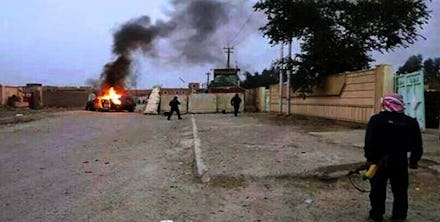The Latest Insurgency in Iraq Proves America's War on Terror Is a Total Failure

Thousands of Iraqis fled from their homes, and Iraq's army and police abandoned their weapons after a violent surge of radical Islamic militants overtook Mosul, Iraq's second largest city.
The Islamic State of Iraq and Syria (ISIS), a splinter group of al-Qaeda has captured Mosul. Iraq's army collapsed in defeat after four days of fighting, and Iraq's government leaders have fled for their lives. This is a red flag that the U.S. invasion of Iraq has been a failure when the U.S. backed government and U.S. trained army cannot even secure the country.
Michael Moore turned to Facebook to hash out both the monetary and physical costs of the Iraq War that doesn't just stop at the siege in Mosul:
"The Iraqi government we 'installed,' has now lost Fallujah, Ramadi, Mosul and other large swaths of the country we invaded at the cost of thousands of American lives, tens of thousands of Iraqi lives and a couple trillion dollars. (What could your school district do with a trillion dollars?)."
He has a point.
To understand what is happening in Iraq today requires examining why the Bush administration launched a war in Iraq in the first place: weapons of mass destruction and al-Qaeda's link to Baghdad, which was false at the time of the invasion in 2003.
Juan Cole touches on the irony of the situation on his Middle East focused blog, Informed Comment. He describes it as "an indictment of the George W. Bush administration, which falsely said it was going into Iraq because of a connection between al-Qaeda and Baghdad. There was none. Ironically, by invading, occupying, weakening and looting Iraq, Bush and Cheney brought al-Qaeda into the country and so weakened it as to allow it actually to take and hold territory in our own time."
ISIS's leader Abu Bakr al-Baghdadi has been described as the "new Bin Laden," and the "world's most dangerous man" in Western media, and the U.S. is after him. But after nine years of U.S. fighting and occupation of Iraq under the other guise: "spreading democracy," why is the Iraqi government unable to centralize rule and secure its territories?
Cole describes the U.S. failure of putting in a government with "an electoral system that emphasizes religious and ethnic divisions." The Iraq war opened the door to yet another war between the Sunni and Shiite Muslims, and the Shiite minority came to power under Prime Minister Nuri al-Maliki.
Iraq's sectarian fueled fighting has continued unabated after the U.S. withdrawal in 2011, and now the norther city of Mosul with a population of 2 million people has fallen to Sunni ISIS jihadists supporting the overthrow of al-Maliki.
The violence in Iraq continues to escalate under Obama with more than 1000 civilians killed in May, according to the website Iraq Body Count. In May 2011, the civilian death count was at 381. After the withdrawal of U.S. troops, the U.S. also lost Fallujah to al Qaeda, and now it's Mosul.
It's time for the U.S. to be held accountable for the horrors it has unleashed on Iraq.